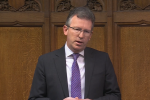
Last week I led a debate in the House of Commons on ‘online harms’, a term which covers many things, from child sexual exploitation to the promotion of suicide, hate speech and intimidation, disinformation perpetrated by individuals, groups and even nation-states, and many other things. Those problems have increased with the growth of the internet, and they have grown even faster over recent months as the global pandemic has led to us all spending more time online. The online platforms have taken some action to combat these harms, and I welcome that, but it is not enough, as the platforms themselves mostly recognise.
Digital platforms should also recognise that a safer internet is, in the end, good for business. Their business model requires us to spend more and more time online, and we will do that only if we feel safe there. In any event, though, Government action is needed. We have operated for some time on the principle that what is unacceptable offline is unacceptable online. How can it be right that actions and behaviours that cause real harm and would be controlled and restricted in every other environment, whether broadcast media, print media or out on the street, are not restricted at all online? It can’t be right, so for me, the case for online regulation is clear. However, it must be the right kind of regulation—regulation that gives innovation and invention room to grow, but that also requires digital platforms to take proper responsibility for their products and services, and for the consequences of their use. They should be subject to a duty of care to keep those who use their platforms as safe as they reasonably can.
Doing what is reasonable to keep us safe must surely be the least we expect of those who create the world in which we now spend so much of our time. We should legislate to say so, and we should legislate to make sure that it happens. That means regulation, and it means a regulator, and if the regulator we create is to be taken seriously by these huge multinational companies, it must also have teeth and a range of sanctions.
We need to get on with this. Not only because, while we delay, lives continue to be ruined by online harms, but also because we have a real opportunity (and obligation) of global leadership here. This country has a well-deserved reputation for respecting innovation and the rule of law and can set a global standard in balanced and effective online regulation. We owe it to every preyed-upon child, every frightened parent and everyone abused, intimidated or deliberately misled online to act and to act now.

